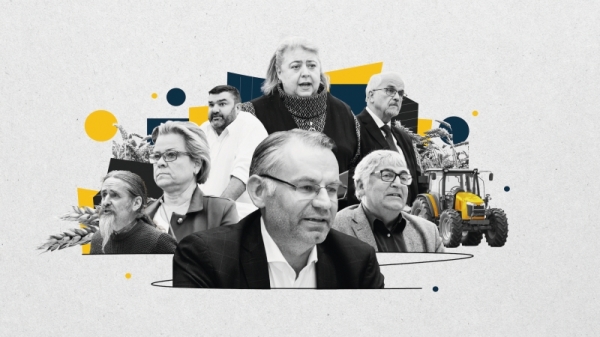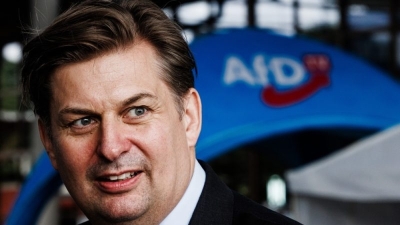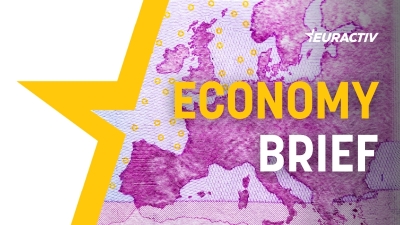EU elections: What’s in for European farmers?

After an unprecedented wave of protests and demonstrations across the EU, and with June’s European Parliament elections approaching, EU politicians of all colours are seizing upon the agricultural sector’s discontent for electoral gains.
The results of the elections will decide the composition of the next European Parliament and will play an important role in deciding who gets the European Commission’s top job – which will be linked to the success of national parties in the polls.
Therefore, the Parliament’s political families, especially the centre-right European People’s Party (EPP), have made agriculture a focal point in their campaigns.
People’s party rebranding
The EPP had been eyeing the title of “farmers’ party” long before demonstrations swept Europe at the start of this year.
In 2023, the group scaled-up its efforts to derail new sustainability legislation and tried to torpedo entire files, including the Nature Restoration Law and a new EU law aimed at curbing pesticide use.
Already in May 2023, during a party assembly in Munich, EPP leader Manfred Weber called for a “moratorium” on new regulations, citing concerns about burdening farmers and endangering food security.
At the same time, Commission President Ursula von der Leyen, affiliated with the EPP, intensified her involvement in farming issues.
For the upcoming mandate, the EPP election manifesto emphasises dialogue over top-down approaches, proposing more incentives and fewer regulations for the sector.
The document skirts specific environmental policies but advocates for a stronger Common Agricultural Policy (CAP) for 2028-2034 that guarantees farmer’s incomes during “volatile” times.
To no surprise, the text also mentions “increasing threat” posed by wolves and brown bears to farmers and livestock breeders, calling for a relaxation of rules for the management of large carnivore populations.
Socialist swing
The Party of the European Socialists (PES) grapples with internal divisions on farming policy, evident clashing over legislation concerning the rules on gene edited plants, livestock emissions, and Russian food imports.
Notably, MEPs like Italy’s Paolo de Castro and Spain’s Clara Aguilera have sided with the farming sector in the face of the Commission’s ambitious environmental agenda.
This also meant that the two agricultural heavyweights often clashed with party colleagues in the Parliament’s Environment Committee, like Dutch MEP Mohammed Chahim and his Spanish counterpart Cesar Luena.
However, De Castro and Aguilera confirmed last weekend that they will not be seeking re-election in the upcoming elections.
For the next mandate, the PES election manifesto pledges to reinforce the CAP, protect farmers’ incomes and jobs, and fight against “unfair competition” from third countries.
The socialists also put the focus on biodiversity protection and improved animal welfare standards.
While hinting at reviving legislation for sustainable pesticide use, the PES did not mention explicit reduction objectives and prioritised “national best practices.”
Liberal challenges
“Farmers are upset, and rightly so,” reads the opening line of the liberals’ priorities for the farming sector, which list short to long-term actions.
Like socialists, liberals grapple with internal divisions on sustainable farming policies.
For instance, some MEPs from the centrist, liberal Renew Europe group, such as Jan Huitema and Emma Wiesner, were aligned with conservatives in opposing the Nature Restoration Law, while others, like France’s Pascal Canfin, staunchly advocated for it.
The proposed measures for the next mandate in the joint liberal electoral programme under Renew include drastically reducing bureaucracy, empowering farmers in the supply chain, increasing state aid, and cutting biofuel taxes.
They also want to improve logistics for agricultural trade flows between Ukraine and the EU, but propose more restrictions on food imports from the war-torn country.
Renew’s mid to long-term plans involve increasing flexibility for EU countries to adapt the Common Agricultural Policy (CAP) to unforeseen circumstances, ensuring sustainable food production, redistributing value within the supply chain, among other proposals.
Green fences
During the current term, the Greens, the fourth largest group in the Parliament, have played a pivotal role in pushing for environmental reforms in agriculture.
With polls suggesting a potential decline in their influence in the next term, the party’s agenda for the 2024 mandate focuses on maintaining strict GMO regulations on plants modified with new gene-editing techniques.
Additionally, Greens advocate for plant-based diets and aim to revive discussions on the sustainable food systems law and other files abandoned by the Commission during the current term, such as the 50% pesticide reduction plans.
They also advocate for banning glyphosate, despite its recent ten-year authorization extension by the EU.
Conservatives’ affair
The European Conservatives and Reformists are yet to unveil their priorities for the next five-year mandate, with the release of a manifesto, planned for 17 April, postponed at the last minute.
Nevertheless, the ECR’s vision for Europe stresses that the EU should adopt “sensible and sustainable measures” to tackle issues such as climate change, pollution, food quality, and food security.
The ECR group has generally opposed all sustainable legislation for the farming sector, and their alliance with the centre-right EPP has been key to toppling new rules.
The group is largely dominated by the Polish Law and Justice Party (PiS), which continues to enjoy popularity among farmers, after scoring 43% of the vote in rural areas in Poland’s April’s local elections.
However Fratelli d’Italia, the party of the Italian Prime Minister Giorgia Meloni, is set to gain seats in the next mandate.
One of the most relevant ECR figures for farming policy in the current mandate has been the EU Agriculture Commissioner Janusz Wojciechowski. In 2019, PiS sent him to Brussels but turned its back on him recently, asking him to resign in the wake of the farmers’ protests.
Make farming great again
For the right-wing populist Identity and Democracy (ID) party, farmers’ protests have been an opportunity to double down on Euroscepticism, mainly by slamming the bloc’s environmental and trade policies.
The far-right bloc, which has not presented an official election manifesto, has called for decision-making power to be given back to member states, portraying agriculture as a part of national European identities to be preserved.
Jordan Bardella, the head of French far-right Rassemblement National and vice-president of the ID group in the Parliament, went as far as accussing the European Commission of wanting to “kill” France’s agriculture.
The nationalistic and anti-green vision for agriculture by far-right parties might gain relevance in the upcoming mandate as the ID and ECR are in the race for the third-largest group in Parliament, closely followed by the liberals, according to the latest projections.
The Left pledges
With 37 MEPs, The Left is currently the smallest group in the European Parliament and is projected to retain its position after the elections.
The two European political families that form the group, the European Left and Now the People, share a commitment to reforming EU farming policies.
The European Left party advocates for abolishing CAP’s per-hectare payment system and redirecting funds toward environmentally friendly agriculture.
Moreover, they propose “cancelling” the existing EU trade agreements with developing countries and replacing them with partnerships that prioritise agricultural sovereignty, fair trade, and social and environmental development.
Similarly, Now the people states that “good working conditions,” high environmental standards and locally sourced products should be the CAP’s main goals and call for trade policies to include higher social and environmental standards.
Read more with Euractiv




